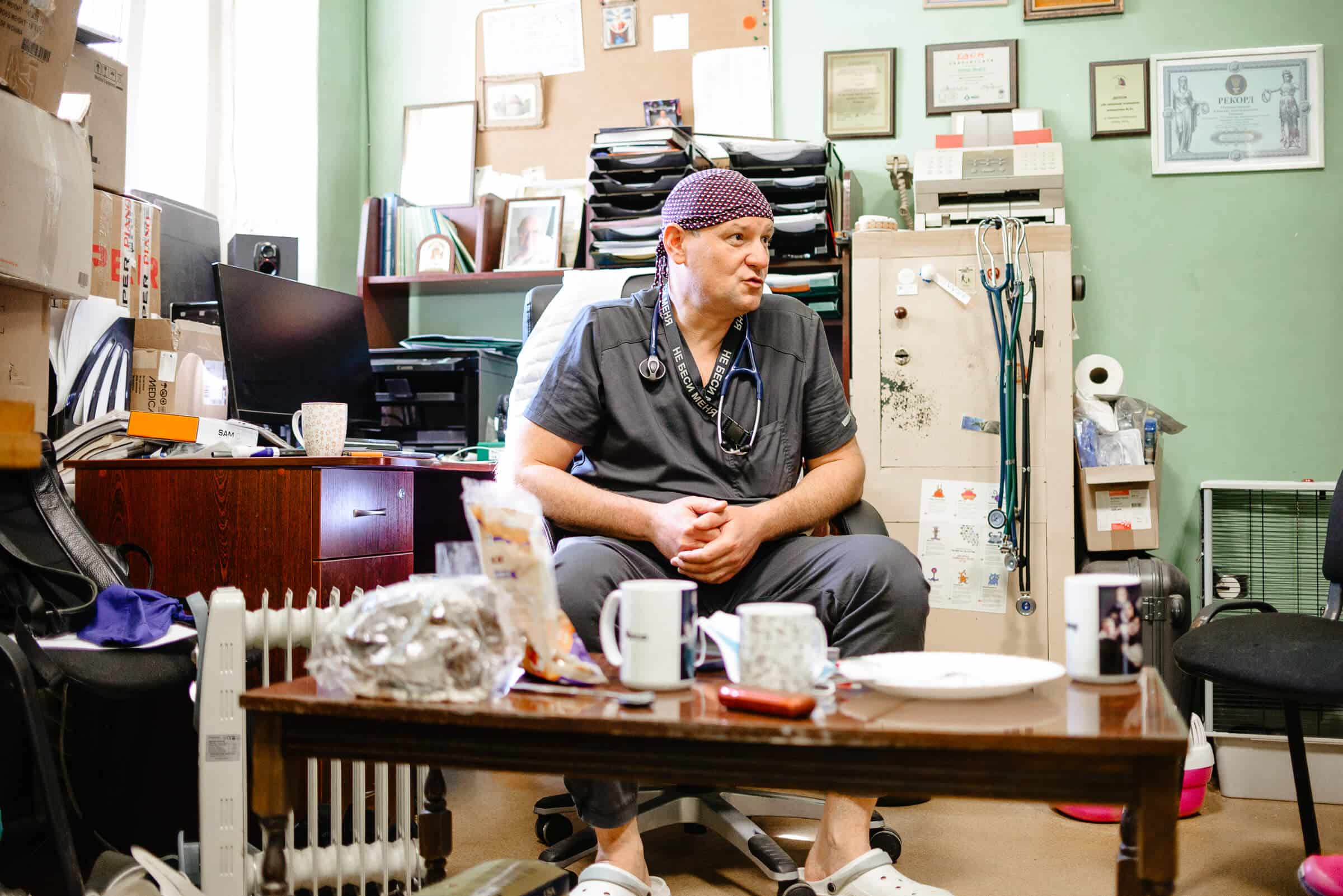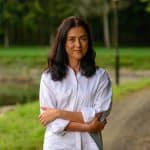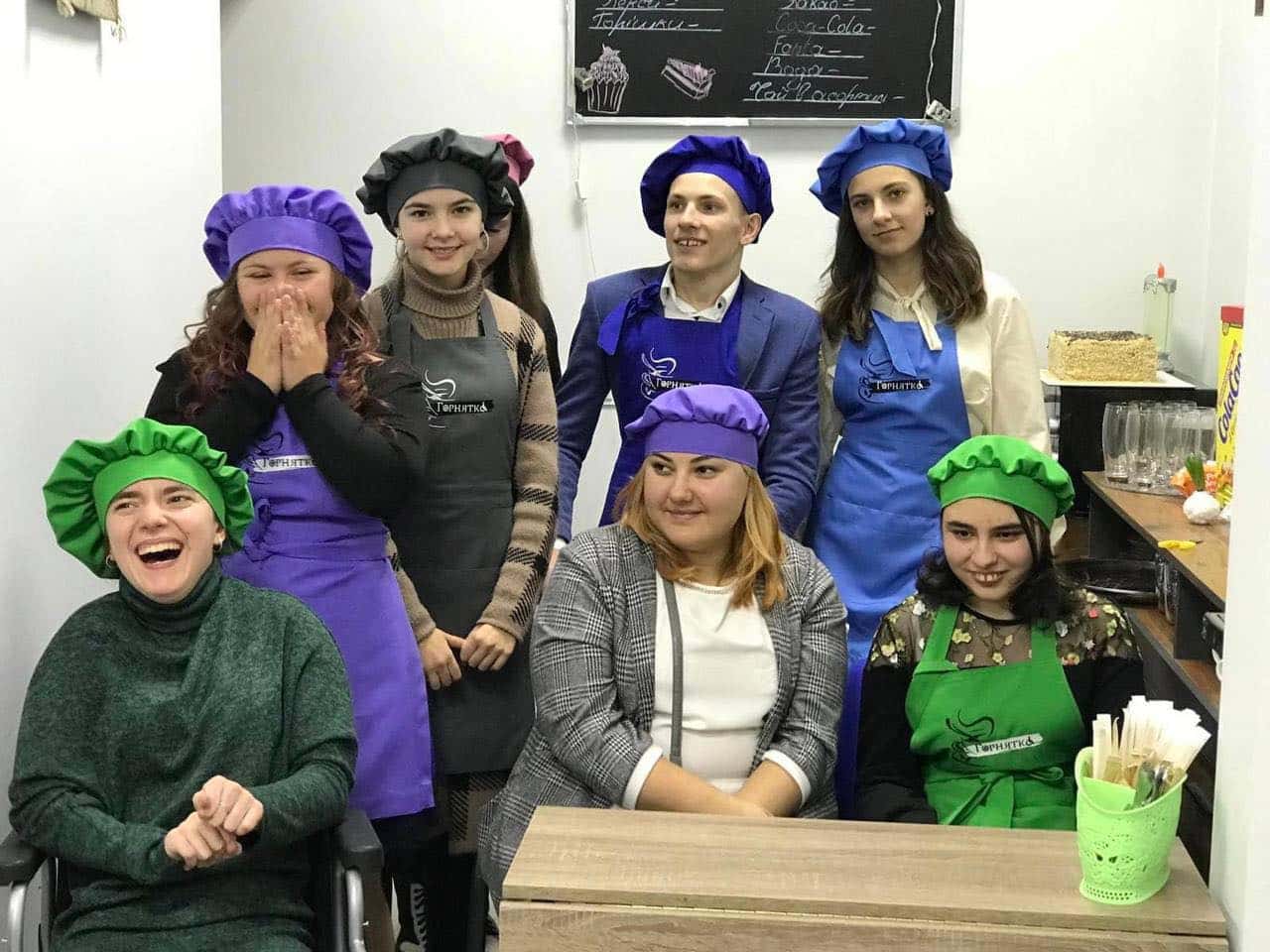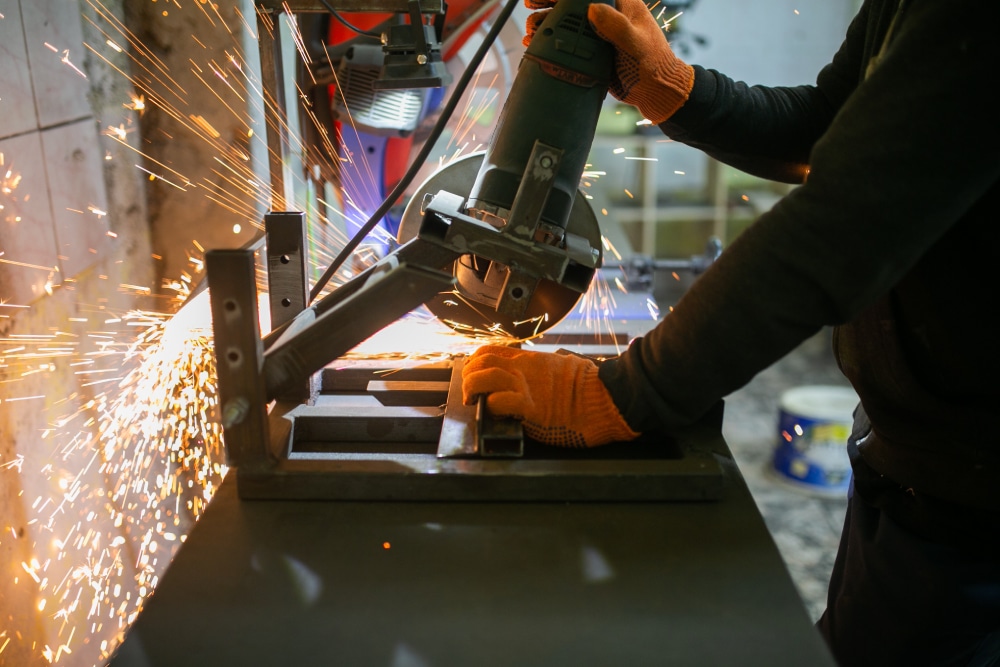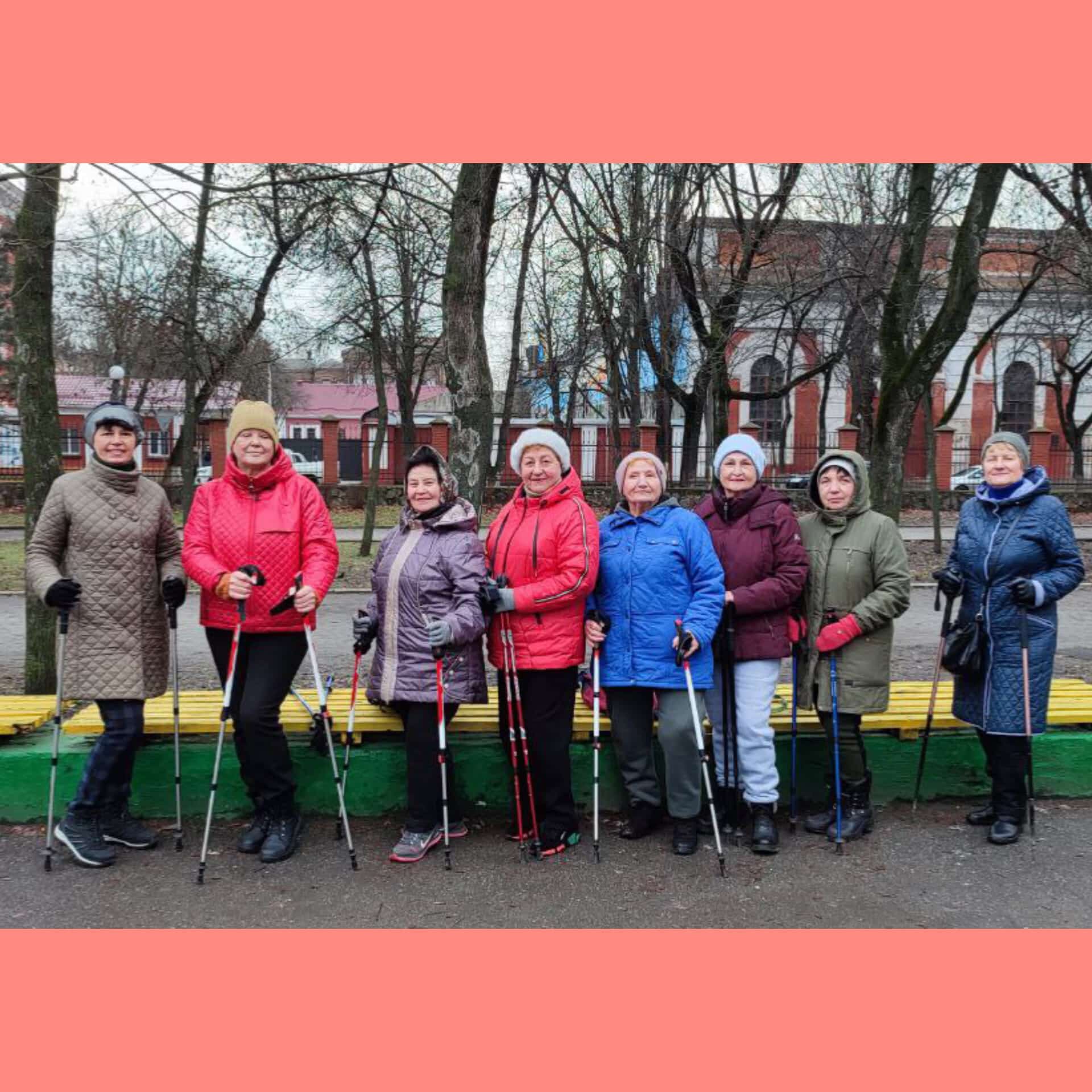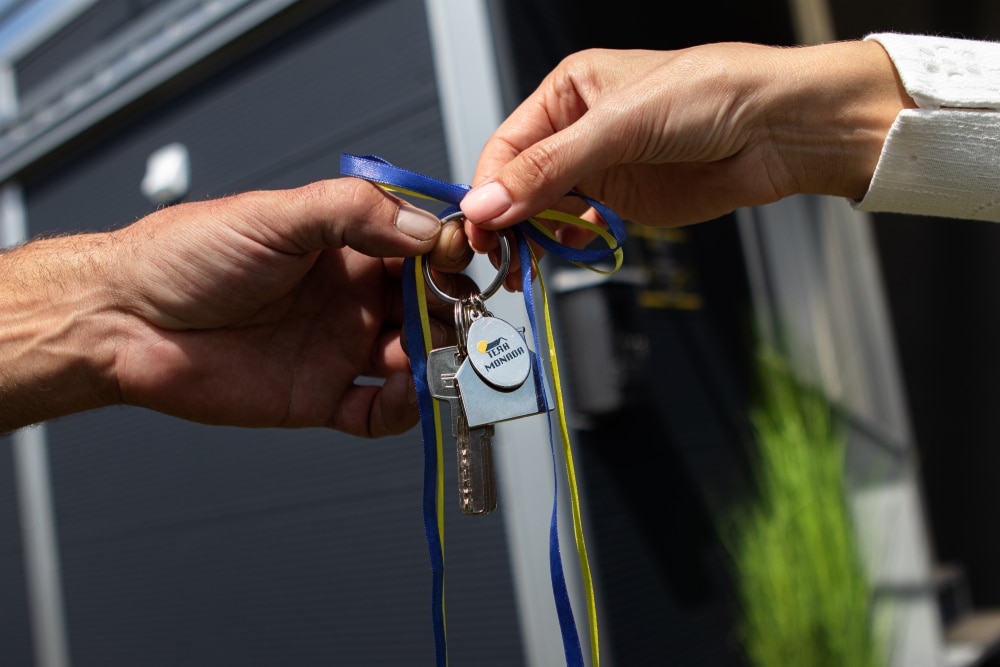These doctors are strikingly different. One of them, a renowned immunologist, enlisted in a territorial defense unit. A couple (both doctors) began volunteering in Lviv. An anesthetist working in Kyiv spent countless hours seeing the wounded during the hardest days of the Ukrainian capital’s defense.
These were different fates of people united by one common feature. The feature thanks to which Ukrainians managed (and still do) to withstand the Russian onslaught. It is their ability to build horizontal networks and work without instructions from above.
Read about how people work on the medical front.
Story number one. Fedir Lapiy. A fighting doctor with a superpower
Fedir Lapiy’s name comes up both in scientific articles and in conversations between moms in the playground when they talk about their children’s vaccination.
Fedir’s superpower lies in his ability to explain important things in plain language.
Fedir Lapiy is a pediatrician and children’s infectionist. He is the chair of the department for children’s infectious diseases and immunology. Prior to the war he and his colleagues founded a public organization ‚Academy of Pediatric Professions in Ukraine‘.
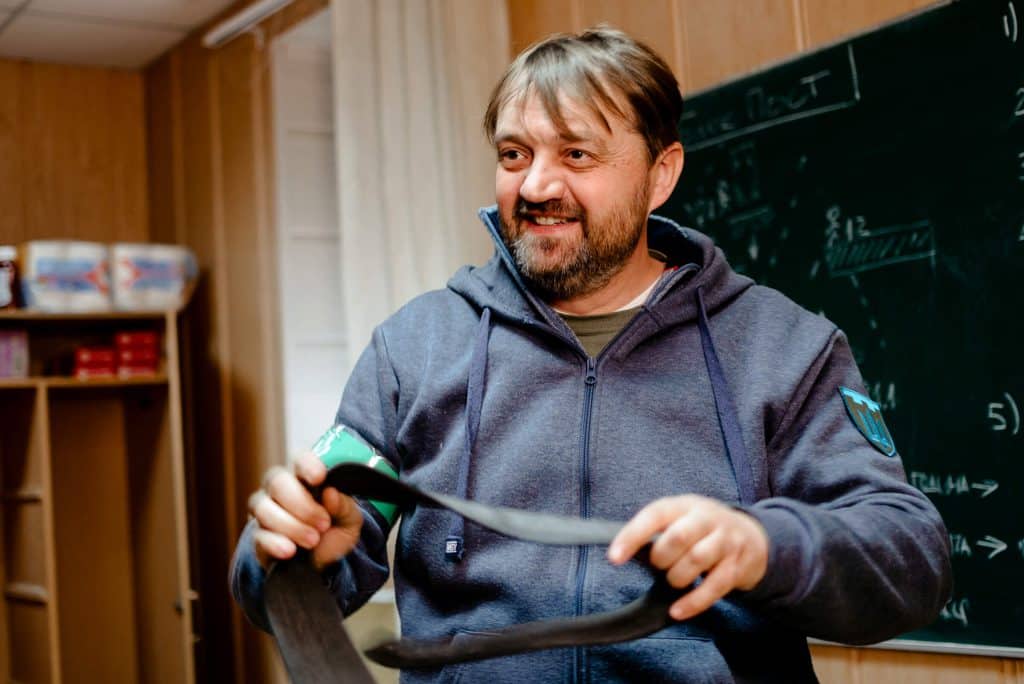
In the first days of the big war Fedir joined the rank and file of the territorial defense unit ‚Chorna Loza‘ (the Ukrainian for ‚Black Grapevine‘ – translator’s note) formed by the Pirnivska community of the Vyshhorod rayon of the Kyiv oblast.
While serving with the unit, he has already gained experience in digging trenches, organizing medical assistance for residents of the community as well as vaccinating his brothers in arms.
Here is what he says about his decision to join the unit:
‚I live in the territory of this community. My home is here. In January it was already clear that we had to start reading ourselves for war. On the night of February 24 I fell asleep at about 1 am. In the evening before my family and I had agreed about which location in West Ukraine exactly they would evacuate. I made a decision to stay. We discussed everything. We knew what we were supposed to take with us. Our suitcases had been packed.
At 4:40 in the morning we heard the first explosions. Missiles hit not exactly the territory of our community, but they were landing somewhere nearby, where a few strategically important objects were located.
A few hours later men holding shovels gathered together in the center of our village. We got into our cars and drove to see military personnel stationed in the vicinity. We were ordered to dig trenches. Missiles were whooshing over our heads. We constantly heard the sound of explosions. On the walkie-talkie we heard the command to take cover in the basements. Those who could were praying.’
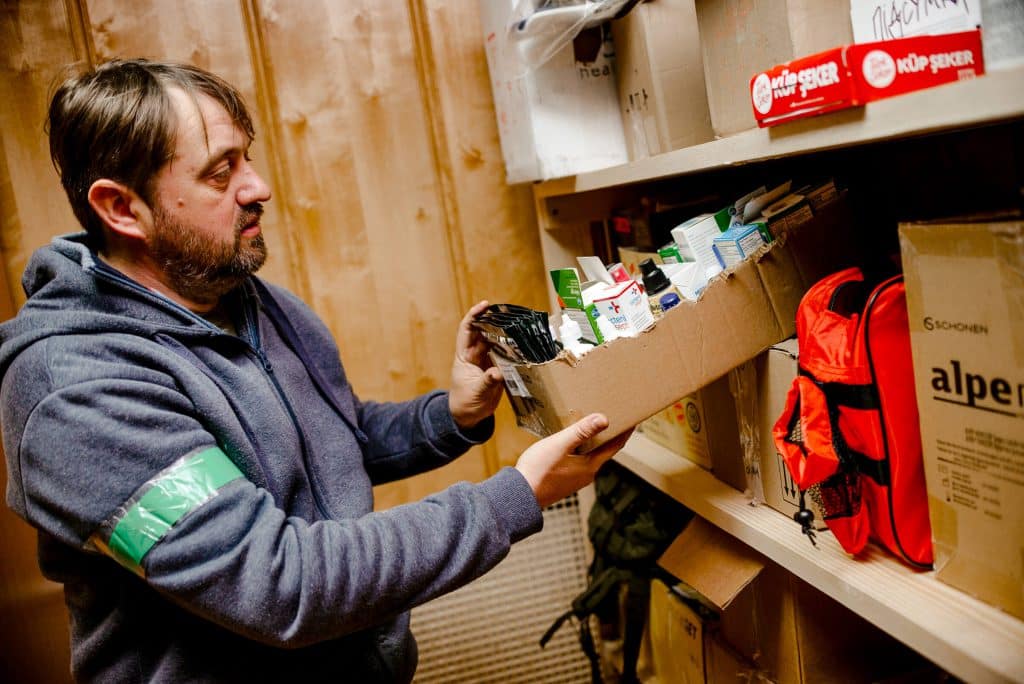
On the first day of the war Fedir made a decision to stay since his skills were needed more here, in his community, rather than at his office. While applying for a place in the territorial defense unit, he got acquainted with many people, in particular, with a local feldsher. They immediately began discussing the issue of providing aid for people who were not evacuating and of ensuring medical assistance for the territorial defense unit. They agreed on the ways of transporting the wounded in case they would be ‚cut off‘ from Kyiv.
A feldsher named Valentyna recognized the doctor. She said, ‚My daughter is pregnant. Fedir, could you deliver her baby?
Fedir answered, ‚Well, if there is nobody else who can do it, I will ask for God’s blessing and do what I can‘.
Luckily, Valentyna’s daughter was delivered to a hospital in Vyshhorod. However, her family had been bracing themselves for less fortuitous developments.
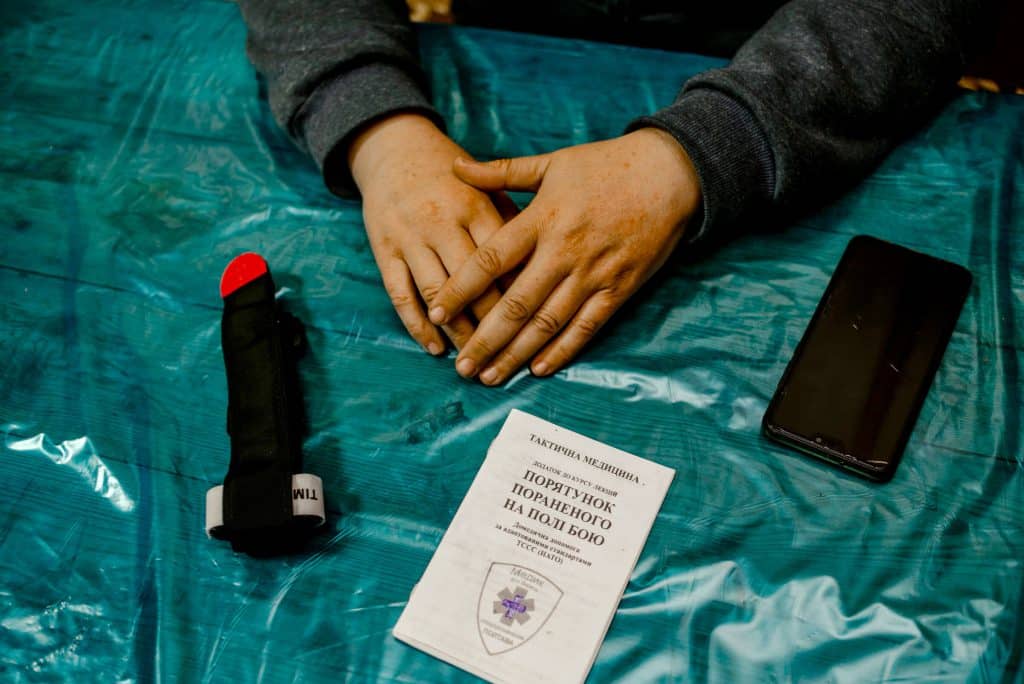
At the Shupyk department for children’s immunology and infectious diseases Fedir Lapiy said that he found it quite difficult to continue teaching:
‚In the first weeks of the invasion my watch would come every other 6 hours. I mean it was far from clear whether I would go home after a 6-hour shift, however, I had to be back doing my watch exactly after 6 hours passed. I would sleep three hours a day, confusing day with night, sleep on the floor (there were no beds), work in shifts’.
He worked together with a mobile group that would respond to calls, i.e. when someone was shooting, moving around or fleeing. Tension was incredible.
Besides patrolling, Fedir Lapiy was also in charge of vaccinating fighters of his territorial defense unit. Inoculated against COVID-19 was everyone who had not been vaccinated before. Booster doses were also provided against diphtheria and tetanus.
There were some problems with the delivery of vaccines, since the process of logistics and the operations of storehouses were disrupted. However, Fedir managed to organize it thanks to the cooperation with doctors.
Also, in the first days he faced the lack of medications. There were no prescription medications in drug stores, such as insulin, thyroxine, hormone medications. Paying for medications was also problematic as people couldn’t withdraw cash or someone had simply run out of money.
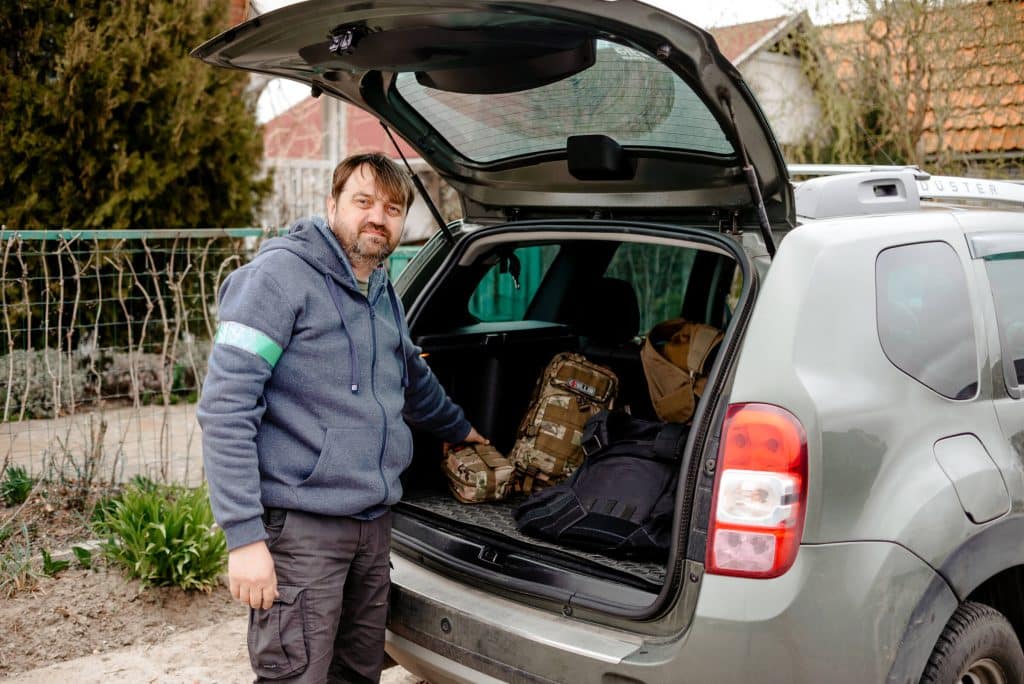
According to Lapiy, but for cooperation between doctors and their ability to respond and interact with one another quickly, the situation could have turned out much worse.
‚We began calling one another asking who needed what. Colleagues of mine started sending me packages with medications. I received tourniquets for the fighters of our territorial defense units. We were getting ourselves ready for different scenarios, in particular, for leading a guerrilla war. My colleagues also sent me bandages and first aid kits.
We were united and well self-organized thanks to the changes brought about in the wake of the Revolution of Dignity. We (I mean pediatricians) launched the Ukrainian Academy of Pediatric Professions in Ukraine. Other first associations of doctors were founded in Ukraine modeled after their European and American counterparts. These are modern and active organizations.
We started building up networks between us and pursued value-based cooperation. Now, in the times of war it is especially noticeable just how our community of doctors and the whole community have changed. Without these changes we would not be able to cope with the present situation.’
We end our conversation with Fedir Lapiy near his house which is a 10-minute drive away from the staff of the territorial defense unit. He built his house in a way so that it would be ideal both for his family and for himself. Wooden threshold, flowers, paintings (gifts from friends) hanging on the inner walls. Over the threshold the Ukrainian flag is fluttering. It has always been hanging here.
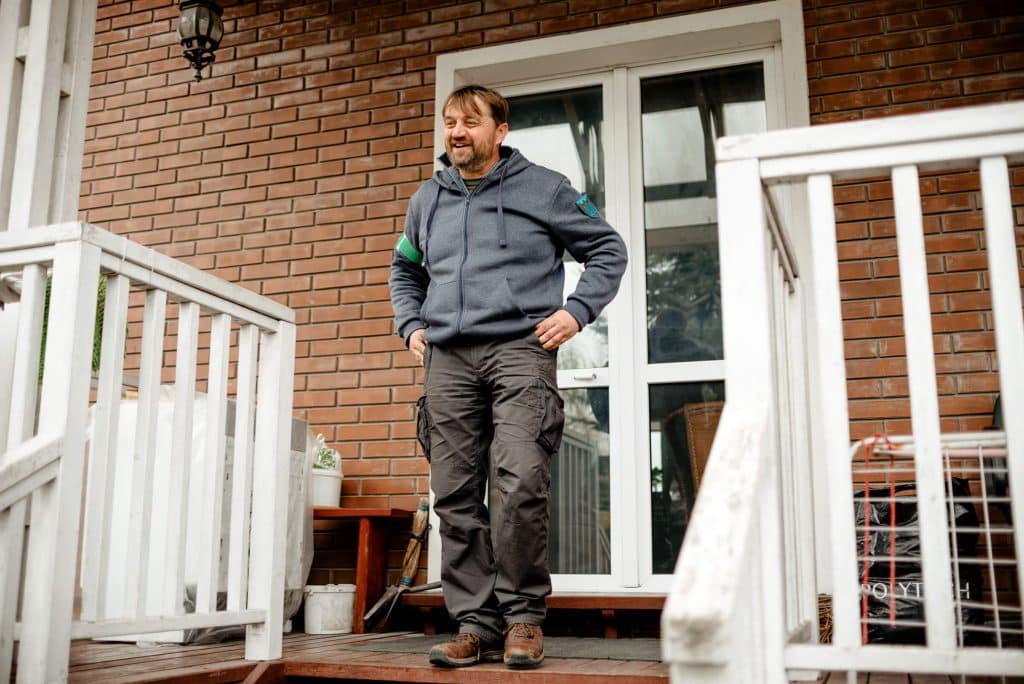
In the yard a big and mighty willow tree is standing. Fedir says that willows are quite uncommon for the Kyiv region because of unsuitable soil. He brought a willow shoot from the Zhytomyr region, where he was born. It was well taken and has grown into a fine tree. Under the willow there is a swing for kids. However, during our conversation there are no children to be seen, as they had been forced to leave their house.
‚They will come back and we will finish everything we were planning to do’, Fedir says in a calm and confident manner while hopping into his car to head back to the territorial defense staff. This is where he has to be now.
Story number two. Serhii Dubrov. Things you cannot get used to.
Glass doors in the hospital where Serhii Dubrov works are covered with posters with information on them about International scientific conferences in which Serhii participated in the capacity of a speaker. In the fiercest days of February, when Russian reconnaissance and subversion groups were roaming the courtyard of the hospital, it was essential to make sure that nobody from outside could spot what was happening behind closed doors of the hospital.
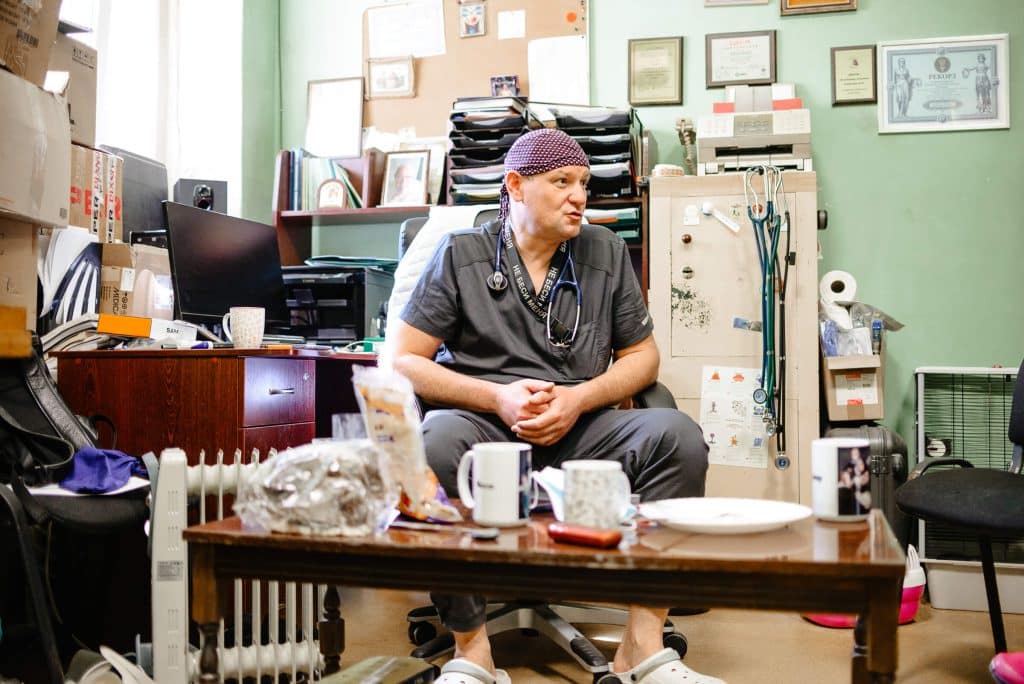
The posters were the first thing Serhii had at fingertips. He is an anesthetist, President of the Ukraine’s Association of Anesthetists, professor and chair of anesthesiology at the Bohomolets National Medical University. He is also an expert in anesthesiology at the WHO. Before the war scientific conferences were something he was involved in on a daily basis.
In the first days of the war Serhii worked 38 days on the spin. In his office, 5 colleagues (doctors and interns) of his were living. They would sleep in armchairs and on the floor.
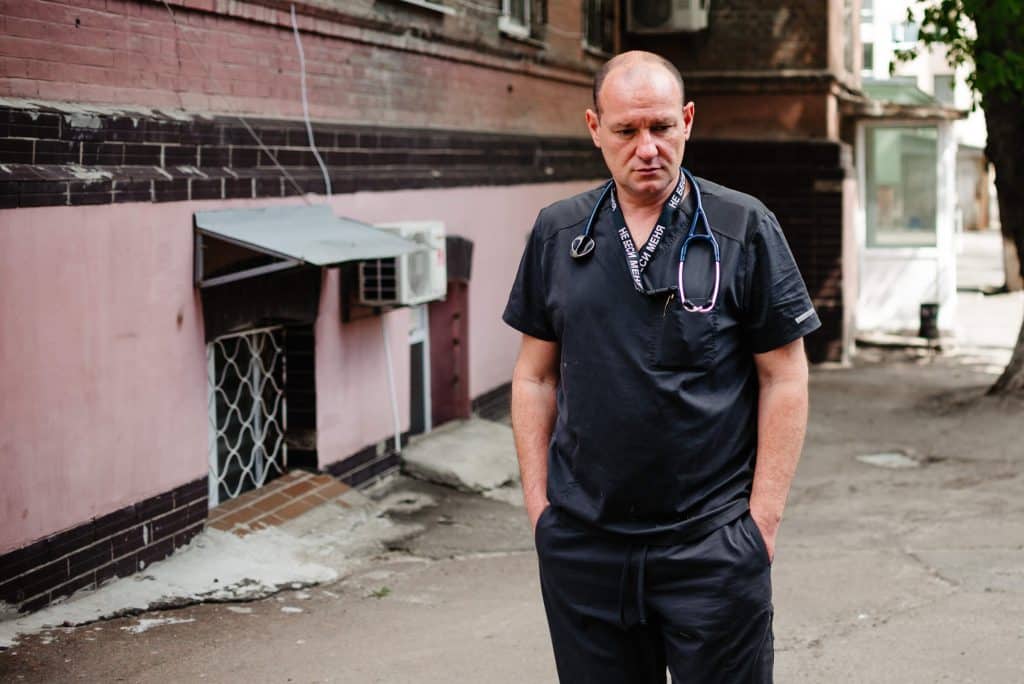
I went outside for the first time 5 days after the war began on February 24. Having crossed the threshold outside, I immediately stepped back inside. It felt unusual to breathe fresh air and be exposed to sunlight.
Serhii recollects the hardest days of the Russian onslaught on Kyiv,
‚There were lots of wounded: soldiers, civilians, adults and children. We experienced no lack of staff – every member of our personnel came to work, even those who had quit working at the hospital before. We all worked as one team, sleeping at most 1-2 hours a day. It was the first time that we had worked in this kind of mode. We had had a similar experience back on February 18-20, 2014’.
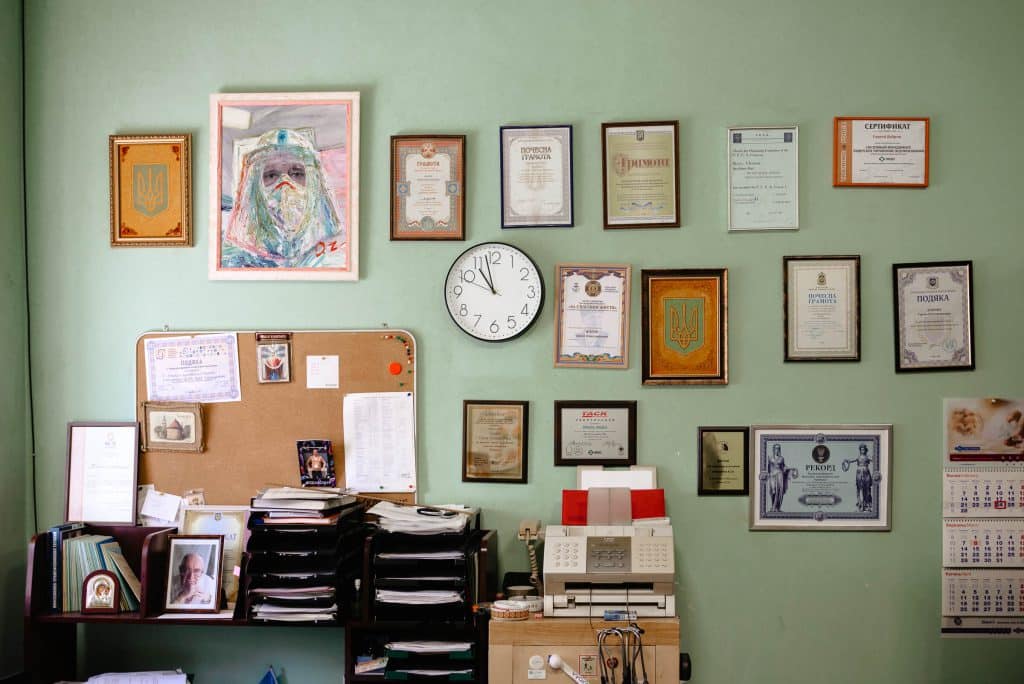
Serhii says that his colleagues and he came prepared for work in such challenging conditions. They would quickly find everything they needed. Barely had someone written on social networks about the needs faced by the hospital when a few hours later volunteers delivered everything.
Entrepreneurs who offer apartments for daily rent brought us bed linens. We always had food both for ourselves and our patients. Only on February 26 did we run out of bread, water and other food products as it was impossible to reach the hospital due to shelling. However, this predicament did not last long. On the afternoon of that very day volunteers managed to deliver everything we needed.
‚We were astounded by the volunteers’ performance. There were unbelievable stories. For instance, we are helped by a volunteer who was a top-manager working with a large pharmaceutical company. She is now working as a nurse’, Serhii says. ‚We were often contacted by volunteers and employees working with pharmaceutical companies inquiring about our needs‘.
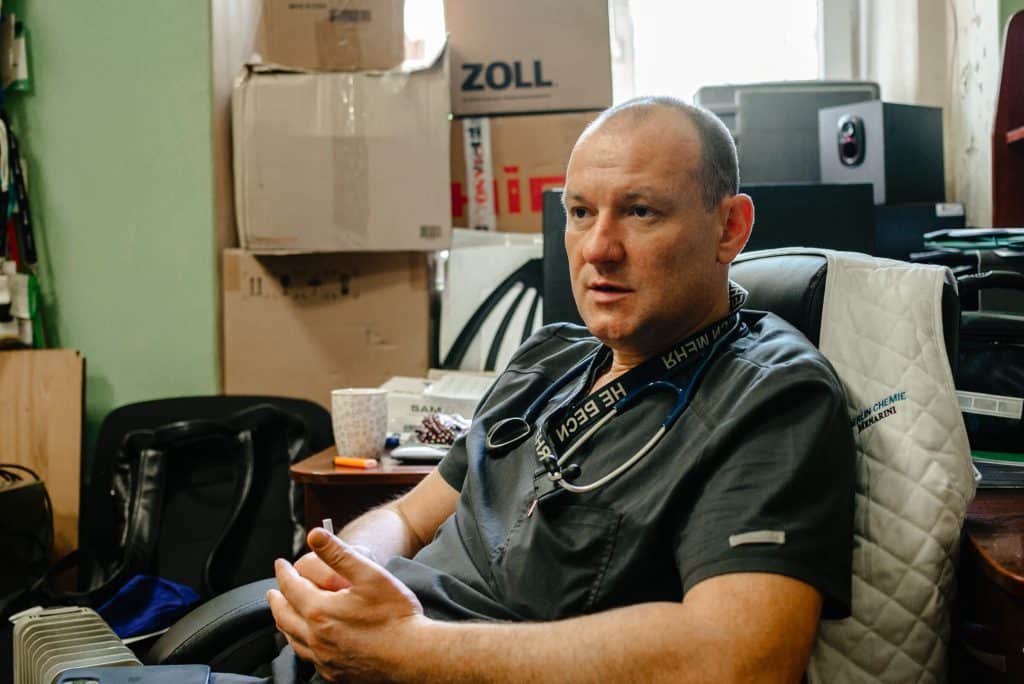
The anesthetist says that his colleagues from other countries also supported Ukrainian doctors.
‚Cooperation with international colleagues is not only about moral support. At one of the events American anesthetists raised 100 thousand dollars for the needs of Ukrainian medicine’.
The hardest thing was to hold back tears after wounded children were delivered to the hospital.
‚Even an experienced doctor may at times find it hard to treat kids with bullet wounds. In the first days of the war a family was admitted to the hospital that had been subjected to shelling conducted by the Russian military. Their child had a bullet in the head while still being conscious. You can never get used to that’.
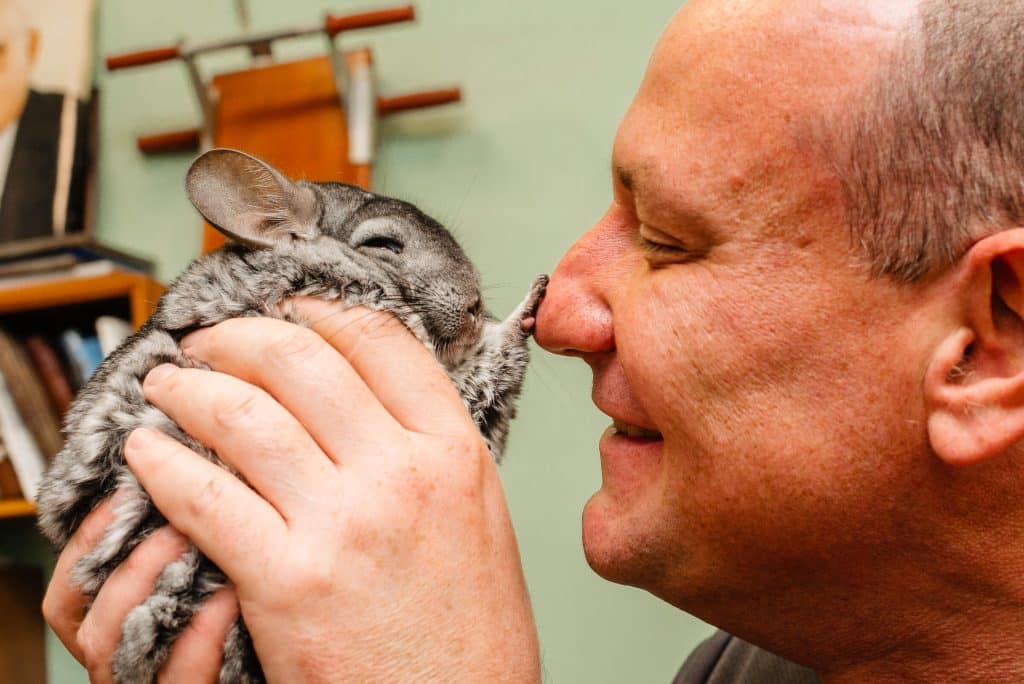
Story number three. Anastasia Khodan and Ihor Zastavnyi. ‚A human alone can do nothing‘
Anastasia and Ihor are a doctor couple from Lviv. They are co-founders of a network of family ambulatories called ‚Vyluk‘ (the Ukrainian for ‚hive‘ – translator’s note) and a public organization ‚The Academy of Family Medicine of Ukraine‘.
We started our conversation with Anastasia and Ihor at a warehouse of humanitarian aid. It was then continued in the city of Vynnyky near Lviv where their ambulatory is located. That is what their routine looks like after February 24. The mode ‚manage everything on time‘ is on.
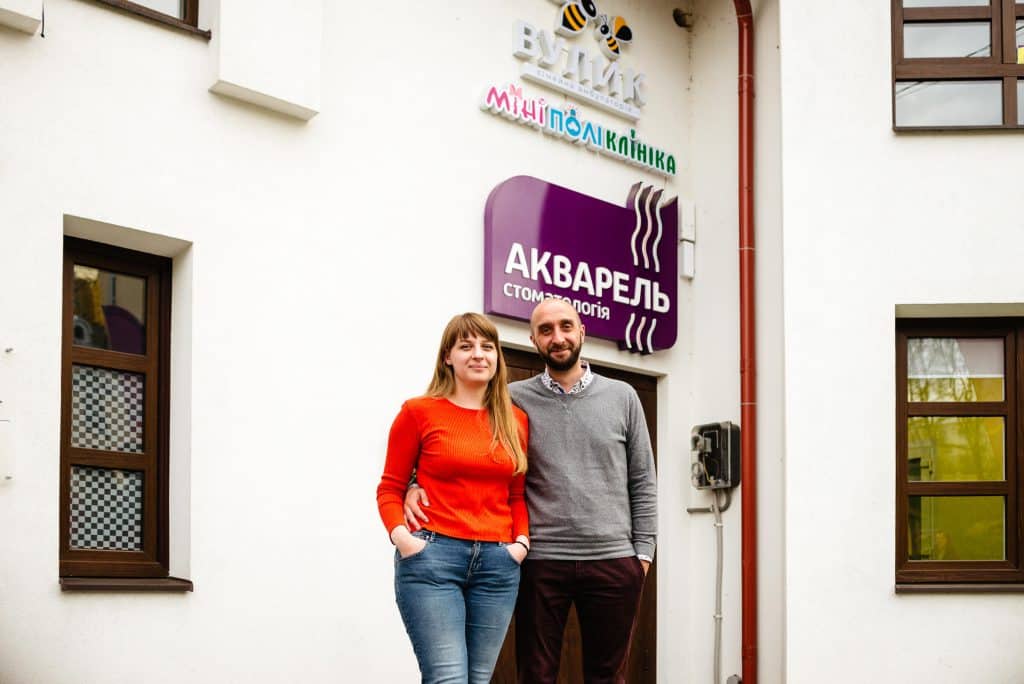
Anastasia is giving us an account of her first days of the war while sorting medications. She cannot stop even for a moment to have a conversation with us. Too great a luxury in our times.
‚We live in one of Lviv’s suburbs, the city of Vynnyky. Our ambulatory is located here. On February 24 at 7 am my mom called me (she lives in the city of Lutsk) saying that their house had trembled because of explosions. We thought that almost the whole territory of Ukraine had been occupied and that Russians were everywhere. Back then we did not know just from how far missiles could be launched. Now we are well aware of both the missiles and war’.
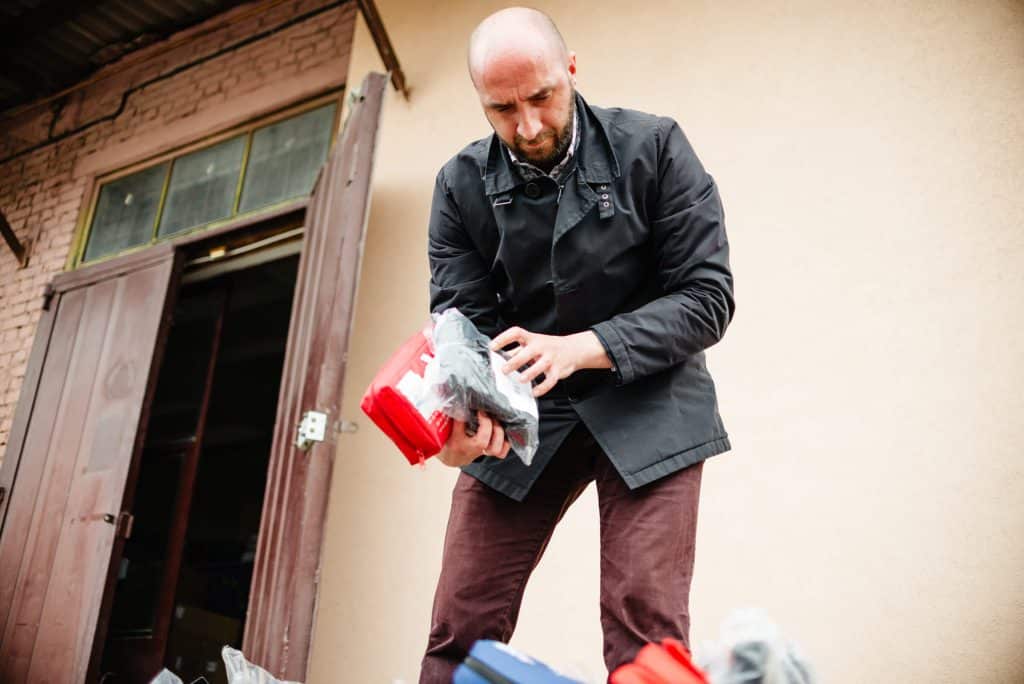
They took their cats and go-bags and took themselves to the ambulatory. They couldn’t come up with a plan in the first two weeks of the war. They could have been conscripted into the army since Anastasia and her husband are liable for military service.
Since the first days of the war their ambulatory has been offering free services to displaced persons. Doctors continued working. Shortly afterwards Anastasia got a call from an acquaintance who said that two trucks had arrived with humanitarian aid. There were lots of medications there so a doctor was needed who would help sort them.
The couple’s activities were gathering pace. They began finding the right people and medications. A spontaneous but at the same time quite efficient system was being formed.
Patients would bring their own tourniquets that they had managed to buy in Switzerland. Others would bring medications.
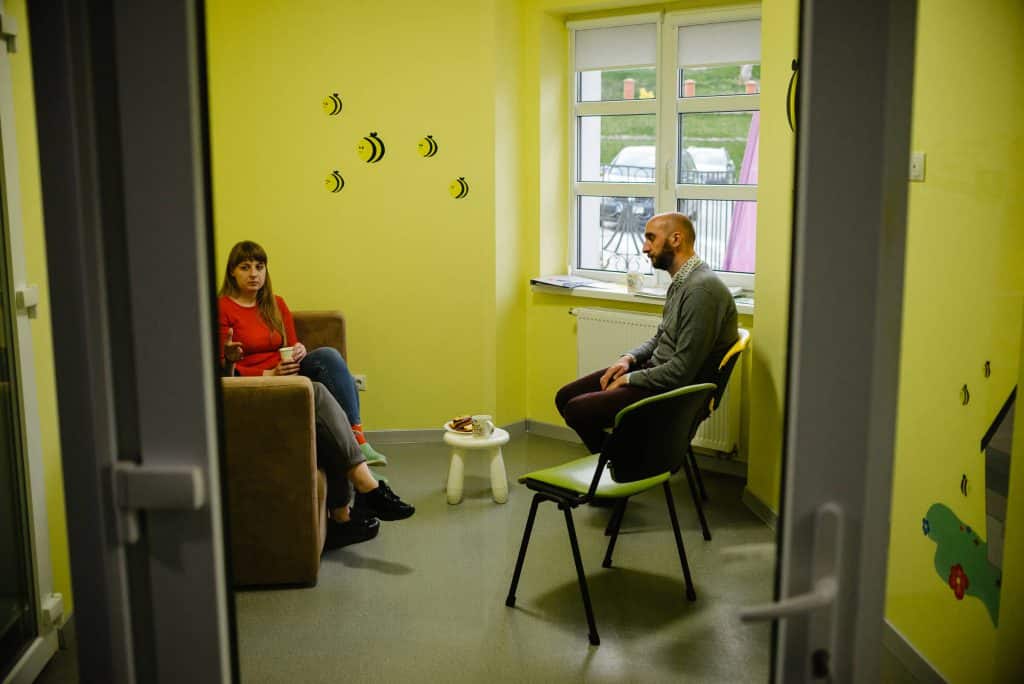
‚Our public organization ‚Academy of Family Medicine of Ukraine‘ (the AFMU) organized a fundraising campaign for medications and tourniquets. The AFMU brought doctors from across Ukraine together. I can assure you that now they are ready to do anything for one another.
The war has shown me one important thing, namely, that a human cannot do anything important alone. It’s all about connections between people and teamwork. It’s about a team capable of doing good things. This is the most important thing’, Anastasia says.
Ihor Zastavniy adds that these are horizontal connections that work effectively in Ukraine, when people do not get any ‚instructions from above‘ and when they are able to make decisions themselves. He explains this phenomenon drawing on the his public organization’s experience,
‚Our organization is pretty much ‚horizontal‘. We do not receive any instructions, nobody tells you what to do and people are not afraid of making decisions. It is thanks to this model that we have proven so efficient in the times of war. On behalf of the AFMU people would contact suppliers, directly searching for other ways of delivering medications where they were needed. The Ukrainian medical environment has proven its maturity and prowess’.
In ‚Vulyk’ you don’t get this feeling that you are at a hospital or a polyclinic. You get the impression that you are being hosted by nice people, offering you a cozy atmosphere with bees painted on the walls.
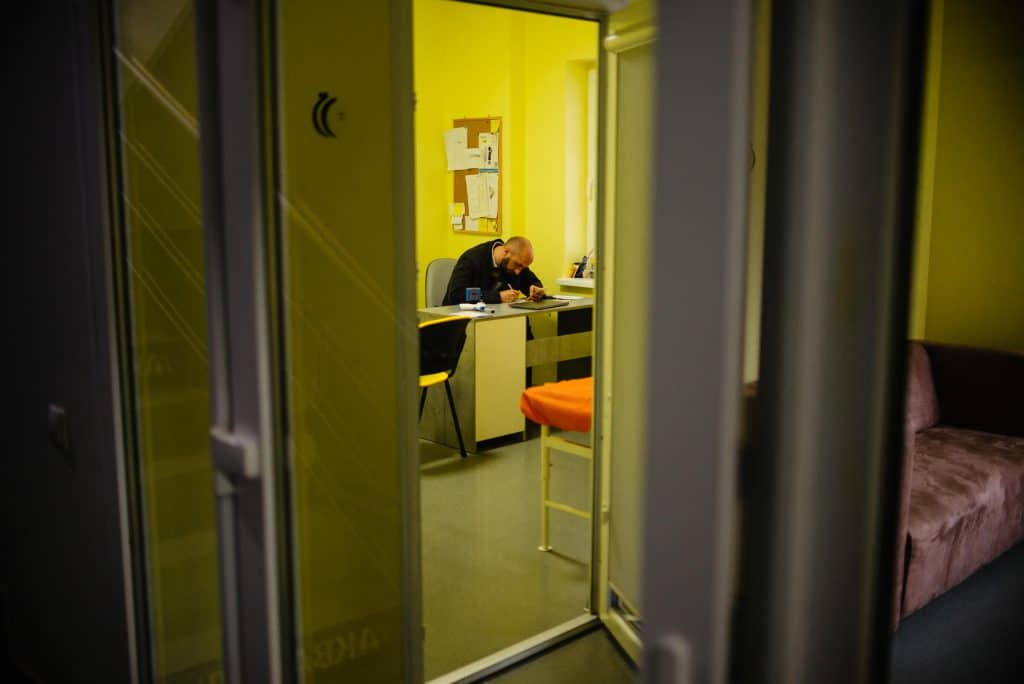
Ihor shows us a hiding place underneath the stairs that he and his colleagues set up. There are also pencils, coloring books and toys inside. He tells us about the story of ‚Vulyk‘ and how they came up with this name.
‚When we were interns, Anastasia, the third co-owner of the ambulatory (Yaryna Pikulytska) and I were running an educational project for doctors. We all saw that lots of medics were against vaccination. We thought that this was wrong and something had to be done about it. Then we launched our public organization and a bee as its logo.
We then decided that telling others how things should be done was not enough. We had to do it by ourselves. That’s how our ambulatories came into being’.
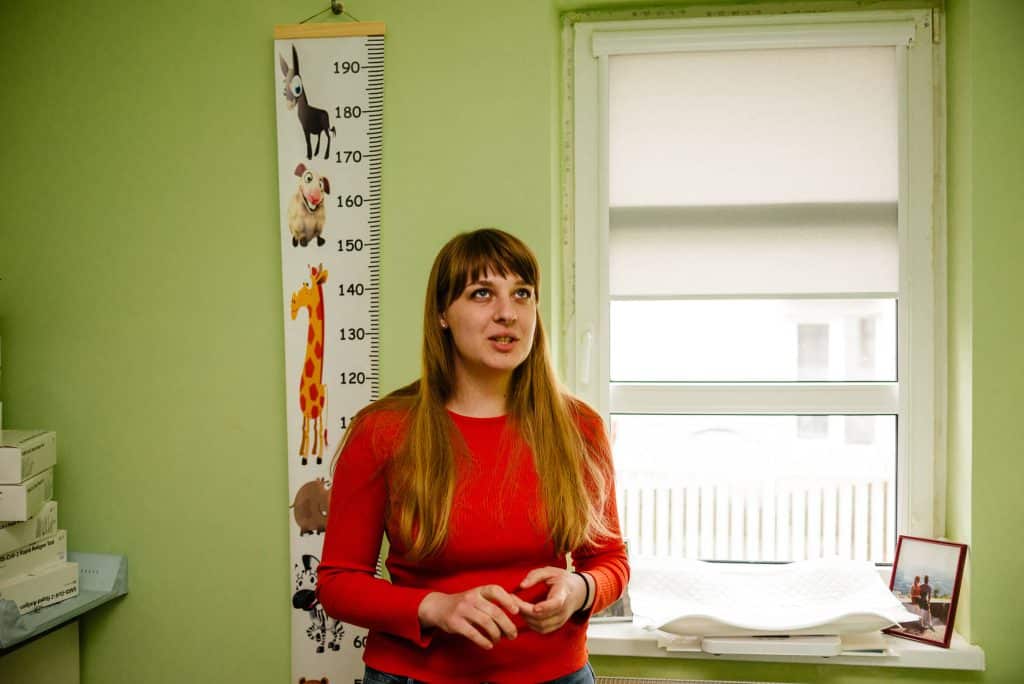
We hear children playing outside. The sun is shining and we enjoy warm weather. Streets are neatly cleaned. A typical European display of coziness on well-maintained streets.
Anastasia Khodan says,‚When seeing all this I come to realize that our people will never give this away to anyone. Ukraine will definitely prevail. Now, as never before, I get this feeling that this is our country and everything we do we do for our own good‘.

